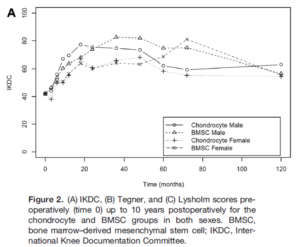Cartilage damage leads to knee osteoarthritis and regenerative cells offer a novel way to promote healthy knee joint function. A new study published in the American Journal of Sports Medicine found that people who underwent regenerative cell injections for knee cartilage defects had the same benefits at 10 years as people who underwent cartilage transplantation surgery (1). The authors examined pain and function scores over the course of a decade, and found decreased pain and improved function. Two groups were studied, one with a bone marrow-derived regenerative cells injection in the knee and the other having a cartilage transplant surgery.
Traditional cartilage transplantation is a sophisticated two staged surgery that requires harvesting healthy cartilage cells from the knee, growing it in a lab, and then reimplanting these cells in a second open surgery. In contrast, regenerative cells can be harvested from bone marrow in the hospital or office and injected in the knee, a much faster method that is 1/10th the cost. This new study provides long term follow up (10 years) showing knee regenerative cell injections working just as well as surgery for cartilage defects.
- Teo AQA, Wong KL, Shen L, et al. Equivalent 10-Year Outcomes After Implantation of Autologous Bone Marrow-Derived Mesenchymal Regenerative Cells Versus Autologous Chondrocyte Implantation for Chondral Defects of the Knee. Am J Sports Med. 2019;47(12):2881-2887. doi:10.1177/0363546519867933


